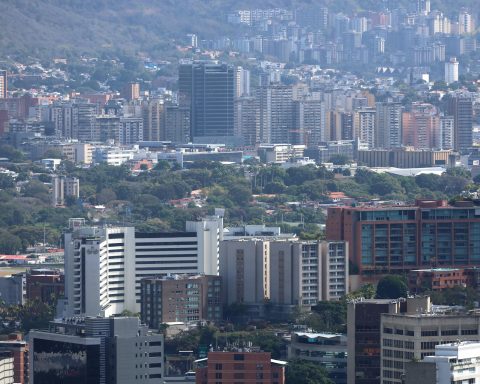
More than 7 months of work, with ups and downs, led the Constitutional Convention to this Tuesday the votes in the plenary session of the first commission reports that could become the future articles of the new Constitution. The acid test of the CC in the search for the two thirds, in which the conventional ones agree that the work from today will be intense and complex, where all the political efforts and the greatest number of meeting spaces will be required.
From 3:00 p.m., the plenary session will begin by voting in general on the report issued by the Justice System commission, which was the first instance that managed to agree on the document to be paid for. The constituent of the UDI, Martín Arrau, requested a separate vote, so each of the 16 articles of this report will be voted on, which changes the panorama with respect to the initial scenario, which was a joint general vote, in which the majority of the constituents saw little probability that the report would be rejected, in spite of the particular questions that there are towards some of the proposals. Some on the right were betting on withdrawing that request and returning to the initial formula, with the prospect that the report would be rejected “at once”, since the general evaluation of the document is poor.
One of the coordinators of the Justice System commission, Christian Viera, maintained that “the vote is important not so much because of the content of what is going to be voted on, which is quite traditional to a jurisdictional model, but because it is the moment in which we will begin to make the first definitions of constitutional content. That moment is especially iconic for what it means to the Convention. I think the contents are neither controversial nor problematic.”
“I would expect most of them to be approved by the quorum established by the regulations. Much has been said that there is no respect for minorities. The quorum of two thirds is a very high quorum and the democratic guarantee is given by two thirds. If these norms are approved, it is a guarantee of a wide acceptance in levels of representativeness of the norms that are promoted”, he added. Viera believes that there will be no obvious differences with the content of the articles, but rather that they will be given in the details.
Until last night, the separate and joint meetings continued to seek consensus, and the efforts were intense during the day between the different groups, in search of support, for example, for the article on legal pluralism. Several of the groups work on their minutes to align the votes, both in general and in particular, but open to changes, since they admitted that during this day, prior to the plenary session, the conversations would continue. “Nothing is written yet,” said a constituent who was part of the cross talks.
articles of discord
The report contains 16 articles, titled: the jurisdictional function; legal pluralism; jurisdictional independence, impartiality and exclusivity; tenure of judges; right of access to justice; effective jurisdictional protection; inexcusability and non-delegability; execution of resolutions; rationale and clear language; gratuity; principle of jurisdictional responsibility; publicity, probity and transparency; principle of open justice; parity and gender perspective; multinationality, legal pluralism and interculturality; and collaborative conflict resolution mechanisms.
Those of discord, yes, there are at least three, where the two thirds could be in danger and put in check the agreements reached in the commission. The one that has more reluctance is the second, of legal pluralism, which specifically posits that “the National Justice System coexists, on an equal footing, with the Indigenous Legal Systems. It is the duty of the State to guarantee adequate coordination between the two, with full respect for the right to self-determination and international human rights standards interpreted interculturally.” The greatest criticism has been made by right-wing constituents, who claim that it is a parallel system of justice.
One of his critics is the UDI constituent Martín Arrau, who generally spoke of “bad proposals”. “When the legal system is fragmented, judicial uncertainty is total, equality before the law here becomes nonexistent,” he said. He said he hoped that the legal pluralism initiative would be rejected “for the good of Chile”, since in the presentations on the subject he warned that the idea of courts of first and second instance was consigned, not of limited issues, but of a broad spectrum of topics. His RN peer, Raúl Celis, one of the deputy vice-presidents of the CC, stated that there is a critical view of some issues defined by the commission, such as “the distinction made between parallel systems, one of them applicable to indigenous peoples . Two completely different justice systems cannot coexist in parallel. It will generate immense legal uncertainty, which is exactly the opposite of what an autonomous and independent judiciary is seeking. Legal certainty is essential for the existence of a representative democracy and the progress of a country”.
However, the promoter of this initiative, the constituent of the Aymara people Luis Jiménez, stressed that this reluctance “is due to ignorance.” “Indigenous justice comes to complement Chilean justice in an intercultural dialogue and equality. The indigenous peoples’ own justice is not thinking about resolving violations, homicides, more than anything it is thinking about resolving territorial issues, sanctions or infractions that are not typified in the law, such as damage to sacred hills. The conventional highlighted that one of the principles is respect for human rights, which is one of the points that some constituents had put on the table to reject the proposal.
Within the Justice System commission, a constituent, off the microphone, stressed that “the biggest problem is that there is a confusion of interpretation, because some see a rule where there is actually a principle.” In fact, in general, even among the right-wing constituents, several say they agree with the general idea of recognizing spaces for indigenous justice, but limited and with processes that in some cases lead to the Supreme Court. Something that from the Justice commission clarify that it has not been voted on. The same constituent Luis Jiménez assured that they are open to discussing the details of what aspects are included in the jurisdiction and who are part of those spaces. The door is open, they say, even for the principle of coexistence to be only included in general, to later specify it by legislative means in Congress.
Lawyer and academician Cristián Riego played down the drama and maintained that this discussion seems good to him in general. “There are several countries that have that article, but it should say (explicitly) that it is with respect to the basic human rights of the people affected. But other than that, it seems correct to me. If the powers of indigenous justice are recognized, indigenous justice is limited by respect for human rights, because there are cases, for example, in Peru, where indigenous justice sometimes has practices that are ancestral, but are not acceptable with the human rights parameters. But it seems to me that it is good that it be discussed”, he affirmed, adding that the detail of what is included in that jurisdiction will have to be seen later in the law.
In any case, yesterday representatives of Constituent Social Movements, PC, reserved seats and other groups, carried out negotiations and conversations to promote the advancement of this article. Until last night, the accounts were favorable, although the right-wing conventionalists reaffirmed their rejection, while there were voices in that sense also in the Socialist Collective. In the case of the Approval Collective, they were about to approve it in general, but reject it in particular.
You may also like:
Another difficult point is subparagraph 2 of article 4, regarding the tenure of judgeswhich establishes that “they cease in their positions only upon completion of the term established for it, upon reaching seventy years of age, by voluntary resignation, by verifying a supervening legal incapacity or by removal”, a paragraph in which some believe it should specify that it applies only to the Supreme Court and not to judges of the Court of Appeals or trial.
In general, there is criticism from right-wing constituents, who claim that the independence of judges will be affected, as the Supreme Court itself stated when this discussion took place in the commission. Similar to what some constituents of the Collective of Approval have raised, who consider that it is not justified to have “judges on time.” Within Non-Neutral Independents there are also nuances, referring to the retirement age of the judges, which they believe may be higher if the person is in their full faculties, despite the fact that in said group they are about to approve the article in general, unlike of the right and the Collective of Approval.
The constituent of Constituent Social Movements, Manuela Royo (member of the Justice Commission), pointed out that “indeed, the international human rights system establishes that it is the State’s obligation to guarantee tenure. Notwithstanding this, it establishes that it can be done by setting deadlines or a retirement age. We believe that the ministers of the Supreme Court should last up to 12 years in that function or carry out their function until the age of 70, but until those terms are met, tenure is maintained and therefore the standards are met.
Lawyer Cristián Riego said he agreed “with it being an age, because at a certain age people begin to lose faculties. 70 or 75 years seems fine to me. I do have a problem in that the judges who are not from the Supreme Court must be for life, they must be until they are 70 or 75, otherwise independence is lost”, and added that “the power as an organism, it seems good to me that be considered a service”, because in his opinion it is the judges who constitute a power, individually, with their independence and impartiality.
In the Socialist Collective also until yesterday there were resentments with article 7, on inexcusability and non-delegability, which proposes that “once its intervention is demanded in the legal form and on matters of its competence, the courts and other bodies that exercise jurisdiction may not excuse themselves from exercise their function in a reasonable time, not even in the absence of an express legal norm that resolves the matter submitted to their decision. The exercise of jurisdiction is non-delegable. In particular, the distance is housed in the specific point of “the other bodies that exercise jurisdiction”, which for some is a reading that numerous jurisdictional spaces can finally be opened.

















